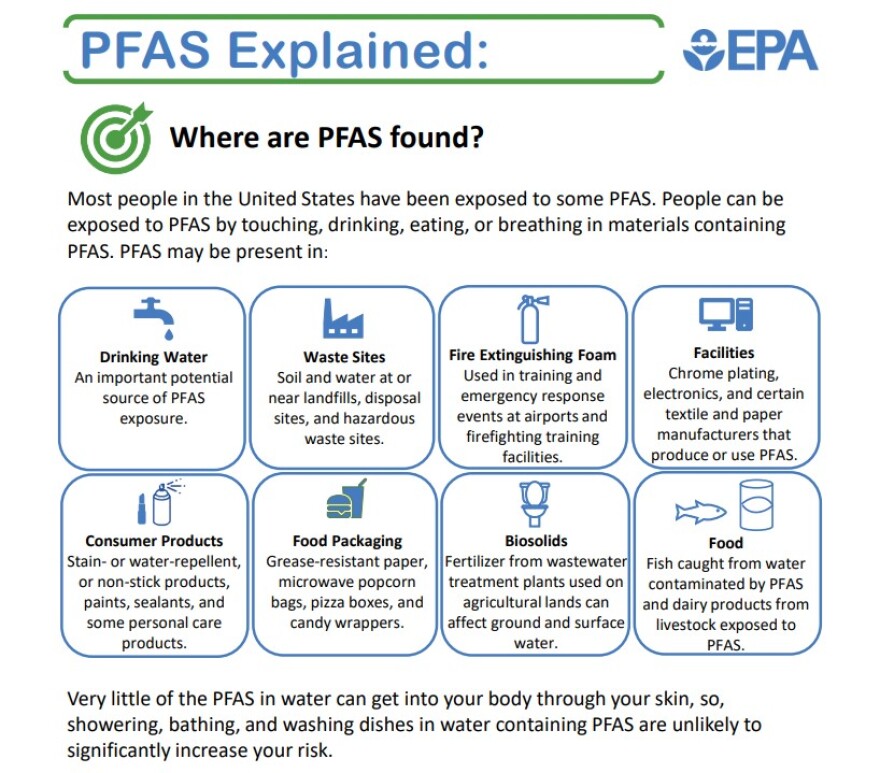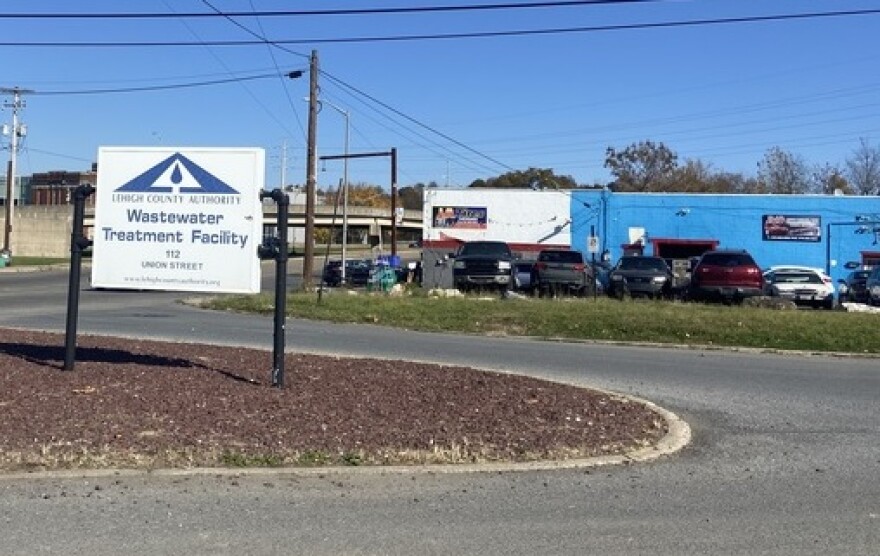EMMAUS, Pa. — The Environmental Protection Agency’s new limits on PFAS, or forever chemicals, in drinking water don't change anything for the borough as remediation plans take shape.
“We're still moving forward,” said Shane Pepe, manager of the borough, where officials are working to remediate four wells. “Our plan doesn't change despite the change in the EPA levels. Our goal is still zero.
“We're moving along — much slower than what I had ever hoped — but we're moving along.”
EPA officials last week announced the first-ever national drinking water standard regulating per- and poly-fluoroalkyl substances, or PFAS, which are widespread, long-lasting in the environment and have been linked to long-term health issues. In the Lehigh Valley alone, PFAS have been recorded in at least five streams, and Emmaus’ efforts to remediate have been costly and well-documented.
Environmental advocates are lauding the new standard, but it'll be several years before it's enforced.
In the interim, legal challenges are likely. While federal funding is available to offset costs to utilities and the residents they serve, there’s national competition, and local water authority officials have warned that rate increases are a possibility in the years to come.
“There's just so much going on in the water and wastewater sector at this moment that is going to challenge systems like [Lehigh County Authority] and our customers."Liesel Gross, CEO of Lehigh County Authority
“There's just so much going on in the water and wastewater sector at this moment that is going to challenge systems like [Lehigh County Authority] and our customers,” said LCA CEO Liesel Gross. “… On the water side, we have this new regulation that we'll need to adjust our treatment processes, potentially.
“We don't have a specific plan developed yet for that, but we'll certainly be working on that so we can be sure that we're in compliance.”
A PFAS primer
PFAS are a group of manufactured chemicals that have been used in consumer products since the 1940s, but have been nicknamed “forever chemicals” because they are incredibly slow to break down once introduced into the environment, and can contaminate groundwater.
They have been linked to a variety of health problems, including liver and immune-system damage and some cancers.

They’re incredibly widespread, from drinking water to food and household and personal care products.
And, they have even made their way into the Earth’s atmosphere, researchers say. From there, they’ve leached into global rainwater systems and have contaminated soil across the globe.
PFAS in the Lehigh Valley
In Emmaus, it’s been a years-long fight to remediate PFAS-contaminated wells — and it's still going.
The borough in April 2022 filed a lawsuit against 3M Co., DuPont and a slew of other PFAS manufacturers alongside other public water providers, alleging that the companies knew about the link between their firefighting foam and the dangers of PFAS since the 1950s, but continued to sell them anyway.
At the end of that year, 3M officials announced they would stop manufacturing PFAS and “discontinue the use of PFAS across its product portfolio by the end of 2025.”
The foam was used for decades at the borough’s Klines Lane firefighting training grounds, as well as other locations.
Last year, Emmaus Borough Council voted unanimously to treat its wells, which could cost $24 million to $30 million over 20 years. Then, 3M Co. settled with multiple plaintiffs, committing up to $10.3 billion, payable over 13 years, for remediation.
But the borough hasn’t seen a dime, and it could be a while before it does.
“We opted out of a settlement with them, and we continued to sue them, and they tried to settle with us separately at a higher amount — a much higher amount than what their initial offerings were,” Pepe said. “We were just about done. Our attorneys spent days in the negotiating room with them.
“We had a tentative agreement, ready to go, and they fired their CEO.”
The company issued a news release at the time, noting CEO Michael Vale “has been terminated for cause” citing “inappropriate personal conduct and violation of company policy, unrelated to the company's operations and financial performance.”
“That put us back to square one,” Pepe said, adding the lawsuit is ongoing.
But, even as a settlement might feel far from reach, remediation plans continue.
“We have finished the preliminary design,” Pepe said. “We are working on the permit package right now with [the] Pennsylvania DEP … Looks like we'll be applying for the permit at the beginning of June.”
“We are confident we will comply with new standards.”Edward J. Boscola, Bethlehem director of water and sewer resources
The goal is to have the permit in hand, and an application for grant funding completed in November. The upfront costs to treat just two borough wells is $10 million.
“It looks like it's going to take about a year to build, which is what we agreed to be a feasible timeline,” Pepe said. “So, I would say by November of 2025, December of 2025, is what the engineers are saying will be the timeline to have the tanks operational.”
After that, there are two other borough wells in need of remediation. While not as contaminated as the others, the estimate is $6 million for both.
The first chunk of money is just the start, Pepe said. Once in place, the infrastructure is costly to upkeep, too.
To change out the bedding, the filters that trap PFAS, in one tank is about $90,000 — and officials aren’t sure yet how often they’ll have to do that.
“We're talking about $200,000 a year just for those two, then if we have those other two wells — we're gonna be spending $350,000 a year, $400,000 a year, just changing out the bedding of the tanks.”
Borough property taxes for 2024 are to be set at 8.3155 mills — up 0.134 mills, or 1.6% from the 2023 rate of 8.1815 mills.
And, the borough is just one of dozens of municipalities in the Lehigh Valley.
Edward J. Boscola, Bethlehem’s director of water and sewer resources, said the EPA’s announcement didn’t come as a surprise. The utility already tests for several PFAS, and results to date are non-detect or below maximum concentration levels.
“We are confident we will comply with new standards,” he said. “The only additional cost is in sampling and analysis. No anticipated need for treatment or rate increase.”
Rate increases are already expected for Lehigh County Authority customers — 270,000 in Allentown and more than a dozen surrounding municipalities — as officials estimate $600 million is needed over the next decade to fix aging water and wastewater infrastructure.
And more charges could be coming down the pipe.
“We have lead service lines in the city of Allentown and some of our other systems that need to be removed and EPA’s proposed rule for lead and copper is to have all lead service lines removed in a 10-year period as well,” Gross said. “So, we're working on three major initiatives all at the same time, all of which potentially could be very expensive.
“I don't have specific dollars or rate impacts to share, but I just wanted to highlight that there's a lot going on in water and wastewater right now that is going to impact customer bills, and we're doing our best to sort of manage all of that at the same time.”

‘Tackling PFAS a top priority’
EPA officials in March of last year announced a proposal to set nationwide maximum levels of PFAS allowable in public drinking water. The announcement came about three months after Pennsylvania adopted new regulations, but the EPA’s were almost four times lower.
The EPA’s final standard, announced last week, set a maximum of 4.0 parts per trillion for perfluorooctanoic acid, or PFOA, and perfluorooctane sulfonate, PFOS, individually — two of the most widely used and studied chemicals in the PFAS group.
It also set a “a non-enforceable health-based goal of zero … reflect[ing] the latest science showing that there is no level of exposure to these two PFAS without risk of health impacts.”
“Drinking water contaminated with PFAS has plagued communities across this country for too long,” said EPA Administrator Michael S. Regan. “That is why President Biden has made tackling PFAS a top priority, investing historic resources to address these harmful chemicals and protect communities nationwide.
“Our PFAS Strategic Roadmap marshals the full breadth of EPA’s authority and resources to protect people from these harmful forever chemicals. Today, I am proud to finalize this critical piece of our Roadmap, and in doing so, save thousands of lives and help ensure our children grow up healthier.”

Under the standard, utilities have three years for initial monitoring. Then, they have another few years for additional monitoring and communicating those results with residents. Starting in 2029, utilities must comply with all maximum contaminant levels, with notifications of any violations.
State Sen. Nick Miller, D-Lehigh/Northampton, commended federal officials on the new standard.
"In meeting with residents and local municipal leaders across the district, some have expressed concerns about the high levels of chemicals in their water,” Miller said in a news release following the EPA’s announcement. “I have directed these communities to commonwealth resources, such as PENNVEST, which can help local government authorities and municipalities with infrastructure updates, like water system projects.
“I am pleased that the administration is taking long-awaited steps to address this potentially dangerous situation. Here in Pennsylvania, our residents have a constitutional right to clean air and water.”
PennEnvironment Research & Policy Center's Clean Water Advocate, Stephanie Wein, said it’s “a long time coming.”
“The EPA is taking a vital step toward protecting Pennsylvania’s drinking water from the toxic scourge of PFAS — including assistance for rural Pennsylvanians,” Wein said. “This step is a long time coming for communities in the commonwealth who have been suffering from toxic PFAS contamination in their water for far too long.
“Hopefully, this rule also reinforces the message that it is time to stop using these chemicals in the first place.”
Federal officials estimate between 6% and 10% of the 66,000 public drinking water systems subject to the standard may have to take action to meet it. Compliance is estimated to cost approximately $1.5 billion annually.
Federal officials have offered nearly $1 billion in competitive grants through the Bipartisan Infrastructure Law to help fund testing and treatment at public water systems as well as owners of private wells.
However, with the expense of remediation unclear, Pepe said it’s not enough.
“There are going to be thousands, literally thousands, of water treatment plants across America that are going to have to deal with PFAS treatment on top of whatever other treatment systems that they have now,” he said.
“So, the reality is, the amount of money that they're kind of heralding that they put out there doesn't scratch the surface of what's going to be paid out.”


